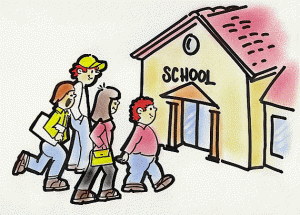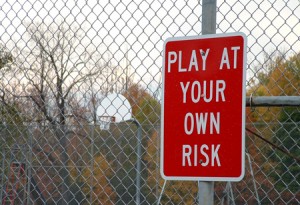One of the most powerful scenes in the NBC hit tv show Parenthood, for me, was when the father sat down to talk to his daughter about how he missed her soccer game due to her younger brother’s Aspergers diagnosis. He needed to be somewhere with his son and couldn’t make it to her big soccer match.
He apologized for how disruptive it had all been for her the last couple of weeks, at which point she says “Weeks? Dad… try years.”
It came as quite a shock to him as she sat there and listed off a bunch of events in their life that was affected by Max (her younger brother with Aspergers)… “ever since I can remember, it’s been all about Max.”
It’s at this point, I wished television had a “look inside his head and see what he is thinking” component but it doesn’t.. in a way, it’s a good thing because that leaves you and I to really take it in with him and realize…. wow.
Advice on how to maintain balance
I’ve had a lot of people ask me lately how I maintain balance between my two boys, Cameron (6yrs old with Autism) and Tyler (3yrs old without Autism)… the truth is, I just keep them both and the need to keep them balanced in my mind.
That may be hugely over simplifying it but at the core, that’s it. I am just always conscious of it and even concerned about it. I don’t want either of them to ever feel left out. So every time I’m with one of them, I wonder what the other is doing or thinking.
Cameron is in a special class, it’s a very very different class from Tyler’s class. He gets better technology to use, there’s less children, more adults and even though the routines are more strict, the structure is less so. Being a class of autistic children, there’s no real curriculum, not in the sense that some other classes have anyway.
We’ve missed out on carnivals and amusement parks because the noise and crowds would simply be too much for Cameron. That means that Tyler has missed out as well. We have avoided some restaurants because Cameron might be overwhelmed at them… that means that Tyler has missed out as well.
Right now, Tyler is 3 and so, that old cliche about not missing what you don’t know about applies. But soon he will…. and he may resent having missed out on some things in his life due to his older brother.
So, every time we don’t do something or change something to accommodate Cameron, we have to keep Tyler in mind… going to a different restaurant, or someplace else that is fun.
It likely never really balances exactly but it’s something. So long as you’re conscious of it, it’s something. An effort will be made.
It goes both ways
When Cameron was little, like, really little, he needed some snuggle time with me every single morning when he first woke up. As he got a little older, he rejected that idea. He not only didn’t need it but didn’t want it. Now he enjoys a hug from time to time, we have our routine hugs and kisses before bed but any semblance of affection in the traditional sense beyond that is nowhere to be seen. Which is ok by me. I know he loves me with or without it.
Tyler on the other hand loves to snuggle while he watches tv, gives me hugs quite often and is not shy about showing his affection at all.
Sometimes this has me wondering though, as I sit with Tyler on my lap watching tv while Cameron is in a chair across the room… does Cameron feel left out?
I have asked him multiple times and will continue to do so from time to time, if he’d like to sit on the couch with me, he always says no… and I respect that. Still though, a part of me wonders if there’s a small part of him that actually would like to but prevents him from doing so. I’m not sure I could describe it adequately enough but you get the idea… a part of him longs for that show of affection but a bigger part of him prevents him going through with it.
It’s also entirely possible that he doesn’t feel left out at all and really couldn’t care less that I snuggle with Tyler and not with him. Unfortunately, there’s a good chance that I’ll never really know for sure… or if I do, it’ll be later in life… when it’s too late.
The future
The problem with all of this is the resentment… what we all fear of our children, regardless of special needs. The last thing we want is for our children to resent each other for something that was our, the parent’s, fault. Something that we could have done better, avoided, recognized… done something about.
Hindsight… it hurts because by the time you get it, it’s too late.
Unfortunately, I don’t know your family dynamic, I don’t know you and I don’t know you’re children… so I won’t be writing any blog posts on tactics to use or methods to apply to your daily life. The only thing I have to offer is…. keep it in mind.
So long as you keep yourself aware of it, you’ll do something about it. Your mind kind of makes you do it.
There are quite a few articles out there, by doctors, with good suggestions… like having nights dedicated to each child, having “desires” lists for each child where they each get to have their desires fulfilled… putting them on equal footing… some of those articles will have some insights that may help you.
But ultimately, only you can know what will and won’t keep things fair and balanced. In fact, chances are you won’t know, not at first. But you’ll figure it out… so long as you always keep it in mind.
Me?
I give Cameron an extra “I love you” from across the room while I have Tyler sitting on me. I just like for Cameron to know that Tyler may be on my lap, but I’m thinking about him too.
See? It’s not complicated. It’s not worth putting into a “how to” article to share with the world. It’s something I do… you’ll find something you can do.
Just remember, it’s not just the negatives (missing out on things, avoiding fun stuff, etc) that cause resentment… it’s the good things too (showing affection, spending more time with, etc).
Keep each child in your mind equally because they are equals. They deserve to be treated that way.














